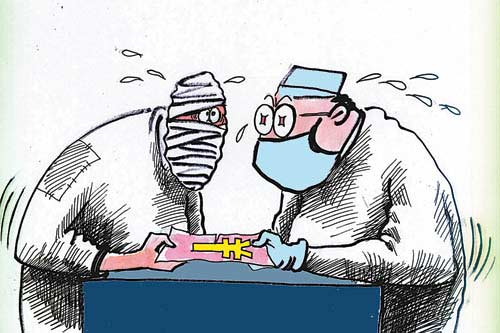(Ecns.cn)--"Chinese doctors are often the victims of terrible violence," and "with hospitals turned into battlegrounds, being a doctor has become a dangerous job in China," reported The Lancet, one of the world's leading medical journals in August 2010.
For over a decade since the end of the 1990s, tension between doctors and patients in China has been growing, with increasing medical disputes and a deteriorating environment for medical practices. As a result, doctors in general are now increasingly worried about their safety at work.
On September 15, 43-year-old Xu Wen, a doctor at the Beijing Tongren Hospital, was stabbed 17 times by a patient. About one week later, the Wuhan Union Hospital in Hubei Province was attacked by the family of a pensioner, who died during emergency treatment.
A recent report by the Chinese Medical Doctor Association shows that 48.51% of surveyed doctors are not satisfied with their medical practice environment and 82.64% believe that China's health systems, including the hospital management, compensation system, and health insurance policy, play an important role in provoking the tension.
Lack of trust
A lack of trust is the significant feature of the relationship between doctors and patients, and also the deep-rooted cause of the mounting tension, analyzed the People's Daily.
"Patients tend to pin their hopes on doctors, and take it for granted that the 'angels in white' will save their lives and help them heal completely. However, the temporary, fragile trust disappears immediately once the treatment is found to be ineffective," Xu Xin, a professor at Southwest University of Political Science and Law, said in a report published in 2008, researching medical disputes in transitional China.
According to Wu Nian, vice head of the Plastic Surgery Hospital affiliated to the Chinese Academy of Medical Sciences, several years ago, parents of a patient recorded all their conversations with their doctor and used it as evidence against him at court for his unsatisfactory treatment on their child.
"The practice that patients prepare evidence for possible lawsuits has severely hurt doctors' feelings," Wu said.
Wang Zhong, deputy director at Peking Union Medical College Hospital, pointed out that even though the medical technology may be limited, most patients tend to believe that doctors are all-powerful. The more they expect, the more they will be disappointed if there is an accident or the result isn't what they wanted.


















